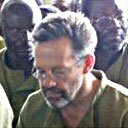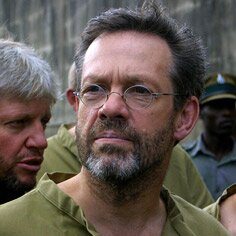
Former SAS officer Simon Mann. Photograph: AP |
Equatorial Guinea pursues Briton over coup attempt
· Zimbabwe magistrate orders extradition
David Pallister and Andrew Meldrum in South Africa
Thursday May 10, 2007 After three years spent languishing in a Zimbabwean prison, the British mercenary Simon Mann was hoping to win his freedom this week, his sentence cut short for good behaviour.
Yesterday, however, the Old Etonian's predicament took a substantial turn for the worse.
A magistrate in Harare ruled that he should be extradited to Equatorial Guinea, the west African nation that was the focus of the alleged coup plotted by Mann and his team of armed conspirators.
The court's decision, which came despite protests from his lawyer that he could face torture and a rigged trial, was viewed by observers as an "oil for Mann" deal. President Robert Mugabe announced in March that Zimbabwe was receiving shipments of oil from the Equatorial Guinea president Teodoro Obiang Nguema Mbasogo. Since the failed coup the two tyrants have become best friends.
Mann, 54, cuts an exotic figure. The former British special forces officer is the son of an England cricket captain and is a close friend of Sir Mark Thatcher, who was also convicted in South Africa of taking part in the plot.
Mann will appeal against the extradition ruling. His lawyers are likely to cite the appalling conditions awaiting him at the grim fortress of Black Beach prison.
Amnesty International and the US state department both have the same description of the jail. "Conditions at Black Beach prison in the capital, Malabo, were life threatening," they said in reports last year.
Inmates are forced to wear ankle shackles 24 hours a day. Many are at risk of starvation if they do not have families to provide for them and medical treatment is either spasmodic or non-existent. Torture - burning and beating the soles of the feet - is reportedly routine.
"Since at least early January 2007 the prison authorities have not provided medical treatment to prisoners," Amnesty reported. "Medical personnel have not been allowed to visit the prison nor have the prisoners been taken for treatment to hospital or to see a doctor outside the prison. In addition, the prison authorities do not provide medicines to those who need them."
One of the alleged plotters, the German national Gerhard Eugen Nershz, died a few days after being taken to Black Beach. The authorities said he had contracted cerebral malaria. He was taken to hospital from the prison some hours before his death and witnesses reported that he appeared to have severe injuries caused by torture on his hands and feet. An opposition activist, Weja Chicampo, who was arrested at the same time, said later he had been so badly beaten he could not eat properly; he was left in handcuffs without water so he had to drink his own urine.
Mann was convicted in September 2004 of attempting to buy weapons without a licence after he landed in Harare with a group of 69, mainly South African, mercenaries. More than two dozen associates were arrested at the same time in Malabo.
Mann claimed that he was en route to guard a mine in the Democratic Republic of Congo but the men arrested with him served less than one year in jail after pleading guilty to charges of violating Zimbabwe's immigration and civil aviation laws.
In yesterday's hearing at Chikurubi maximum security prison where Mann had been held, magistrate Omega Mugumbate rejected arguments by his lawyer, Jonathan Samkange, that he would not receive a fair trial in Equatorial Guinea.
"The extradition application is not prohibited in terms of the law," said Ms Mugumbate. "[The] respondent did not prove charges of torture while [the] applicant provided a prima facie case against respondent. It is hereby ordered that respondent be extradited to Equatorial Guinea," she concluded.
During the extradition hearing Mann said that he should not go to Equatorial Guinea because he believes the authorities there will torture and kill him. Mr Samkange argued that international law bars the extradition of people indicted in political trials or facing possible torture.
"It would be a very sad day if Zimbabwe were to extradite a man against all international conventions," he said in his closing arguments last week.
Equatorial Guinea's attorney general, Jose Ole Obono, told the hearing that although his government believed Mann was the "intellectual head" of the alleged plot, he would get justice. Zimbabwean state lawyers, assisting the Equatorial Guinean officials, made several assurances that Mann would be treated fairly and that his trial would be heard by a judge appointed by the African Union. The Zimbabweans also vowed that Equatorial Guinea would not impose the death sentence if Mann is found guilty.
"Mann's fate was decided by Mugabe's need for oil, not by the legal arguments," a legal expert in Harare told the Guardian yesterday. "As soon as we started getting shipments of oil from Equatorial Guinea, Mann's extradition was assured."
If Mann is taken to Malabo he will join the five South African plotters who remain in Black Beach, including his main associate, the former South African soldier Nick du Toit. They are serving up to 34 years and have complained of poor food, constant shackling, lack of medical help and, in the first weeks, repeated beatings.
The plotters
Of the more than 80 men convicted of the coup plot only six remain in prison: Simon Mann in Zimbabwe and five South Africans in Equatorial Guinea. All the other 69 mercenaries arrested with Mann at Harare international airport served less than one year in jail after pleading guilty to charges of violating Zimbabwe's immigration and civil aviation laws.
In Equatorial Guinea, six Armenian aircrew, allegedly part of the conspiracy, were given a presidential pardon. Five others, including Mann's main co-conspirator, Nick du Toit, are serving up to 34 years in the notorious Black Beach prison.
In 2005, Sir Mark Thatcher pleaded guilty in South Africa to helping to finance the sale of a helicopter to be used in the attack. In a plea bargain he was fined and given a four-year suspended sentence. But most of the other figures behind the coup attempt escaped, including the exiled politician Severo Moto. Lord Archer has not confirmed if he was the JH Archer who donated $135,000 to Mann's account.
|







